My sister Katie, and I were talking about social anxiety recently—something we both struggle with a lot.
“My therapist said I always automatically assume I’m an outsider,” she said. “I hold myself away from people and assume I’m on the outside of what they’re doing. And she said that attitude is a choice, and I can change it. I can start assuming I’m included.”
I have been mulling over that idea ever since. Because she and I assume the same thing.
Look, if you knew my sister’s story, you would understand why she assumes she’s on the outside. Just as a for-instance, she was adopted, which is a significant loss for any child, and then her adoptive family—our family—sent her to a children’s home for nearly half of her childhood. She was an outsider, growing up. Her assumption was based in painful reality.
And on my end, I grew up watching the relationships with my siblings—especially Katie—wither away. I often felt rejected and alienated from them, and like most kids, I assumed it was my fault. And then I went through the typical experience of being excluded at school. My sense that I was an outsider calcified.
SO I don’t want to make it sound like changing these attitudes are easy. Sometimes chirpy posts about changing ourselves rub me the wrong way, because often we have very good reasons for our attitudes.
All that said, though, we have choices about how we face the world. We always have a choice.
I’ve been to church twice in the past three weeks. I went to the main services, instead of high-tailing it for the Hispanic service on the other side of the campus. I love worshipping in Spanish with the friends I’ve made there, with the awesome preaching, but it’s not a coincidence that by worshipping there, I don’t have to talk to anyone who was around back when I was in high school, back when my husband and I were in leading small groups, on the worship team or in any of the number of ministries we’ve called home.
The Hispanic church is safer. It doesn’t have as much history.
After I talked to my pastor about high school and felt like he—and one of our associate pastors—treated me with respect and empathy, I waited a while, seeing how this new sense of healing felt.
Would it make me want to go back?
It did.
And, just as importantly, I have been missing community. Missing fellowship. I read through the BCP alone on Sundays, but the communal prayers feel flat on my tongue. What was enough before is not enough now. I need people.
And now that I don’t have the same metallic tang of cynicism about our congregation in my mouth, I realized I would actually like my church to be my people again.
I think.
It took a lot for me to decide to stop going to church, and it took me just as much awkwardness to walk into the congregation. I was around enough—especially up on stage—so people noticed my absence.
Like Flavia DeLuce, heroine of Alan Bradley’s mystery series put it, “I hate being the center of attention, and yet at the same time I can’t tolerate being ignored.”
I want people to notice that I’ve been gone. But if they do, I feel mortified. I want to explain why we’ve been hermits, while grumbling that it’s nobody’s business, anyway.
This past Sunday, I got up the courage to go give some old friends hugs and talk to them a bit about where we’ve been. They embraced me and said how glad they were that I had been able to process it all.
And what struck me, speaking to them, was that this is what I’ve been longing for. I wished I could tell my story and hear others’ as well. I wished we could mourn together, and change things for the better together. I wished I could belong, with all my messy bits acknowleged and known.
It’s okay to be angry that it didn’t happen like I hoped. It’s fine to know it’s never as easy as a hug on the patio. But it feels better to try, now that doing so doesn’t make me panic.
I don’t know exactly how to feel at home in the church again. But I’m trying not to overthink it. You make a home by staying someplace. You make the unfamiliar familiar by the routine of showing up.
You go from the outside in by taking one step at a time, and opening the closed doors you encounter along the way.
Image credit: Georgie Pauwels with my modifications


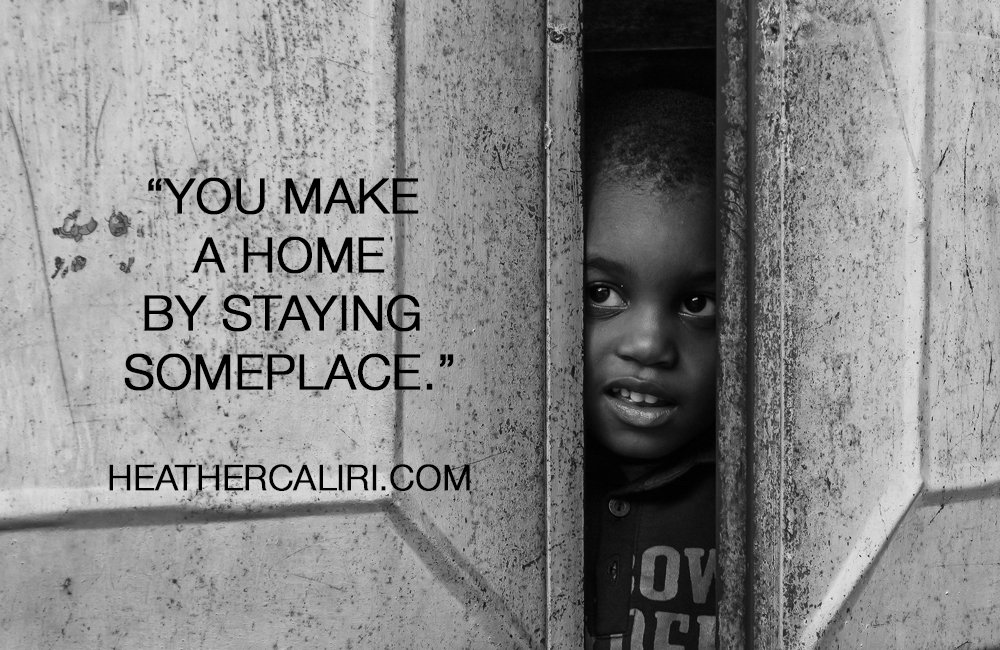





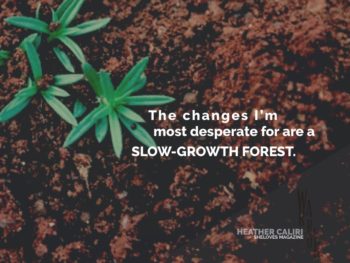
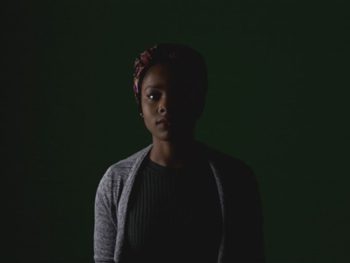
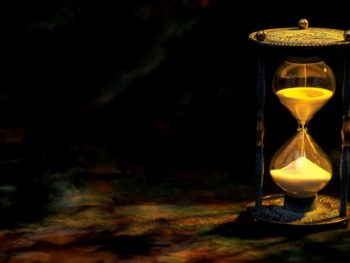



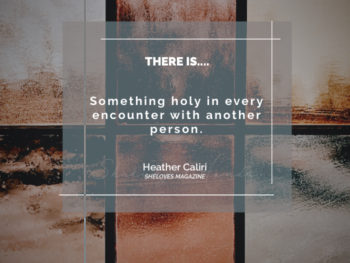
 Dirty is human: #wordmadeart
Dirty is human: #wordmadeart
I assume I’m an outsider, too. I wait on the edges to be assured I’m included. At the same time, as much as I want to belong, it feels safer to stay on the outside where it’s easier to walk away if things get ugly. I appreciate your acknowledgement that there are good reasons we learn to feel this way. Just because we have a choice doesn’t mean change is simple or painless. Thanks for the encouragement to show up and take it one step at a time.
“it feels safer to stay on the outside where it’s easier to walk away if things get ugly.” Oh, yes. Also, it provides a nice distance for judging other people. Not that YOU would do anything so petty 🙂
It’s absolutely a baby-steps thing, a spiritual practice. Being made an outsider isn’t all bad–it gives you compassion, gives you a prophetic heart, and helps you learn how to connect with people from scratch, which reaps dividends. It’s not ALL bad. But knowing the downside of it, and being compassionate about working around that will reap dividends too 🙂
Thanks, Heather, for sharing this other side of belonging (but not feeling like belonging) to a community. I can relate. After the “honeymoon” period of joining our church ended, my same old insecurities rose up and my mental tape resumed playing. But I’m hoping that I can confront these feelings this time in the context of God’s love and a friendly yet flawed community. After all, I’m trying to accept that I’m friendly and flawed, too! I’m finding that consistency … just showing up … is a big part of things. And not allowing my expectations to get in the way of the truth (and joy) moment. (Wish I felt this “wise” all of the time 🙂 )
Oh, Colleen, this really speaks to me. Yes to showing up, yes to keeping expectations minimal. I need to keep telling me I’m not doing church wrong. It’s just taking it as it comes (assuming, of course, that no one is being abusive….)